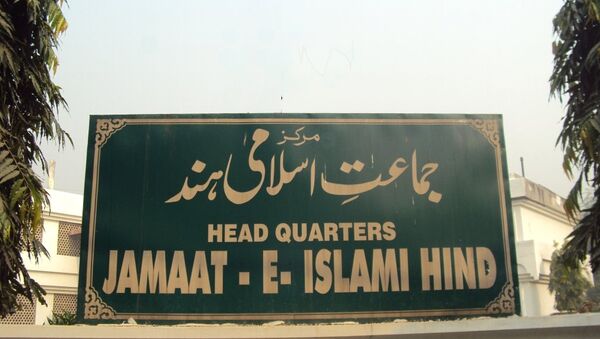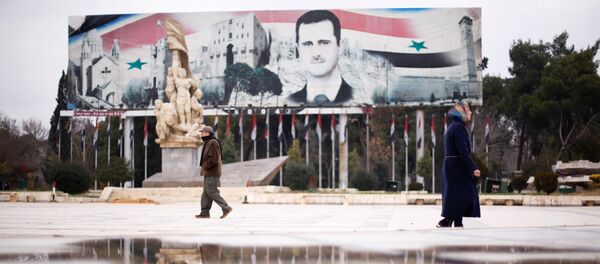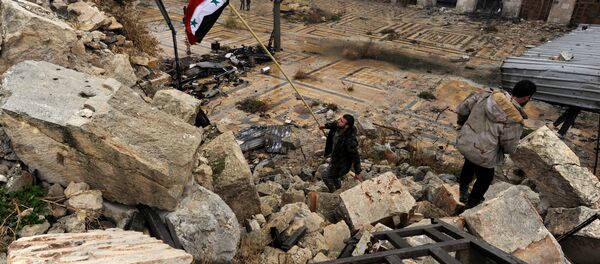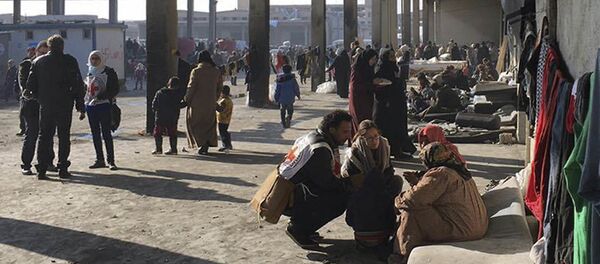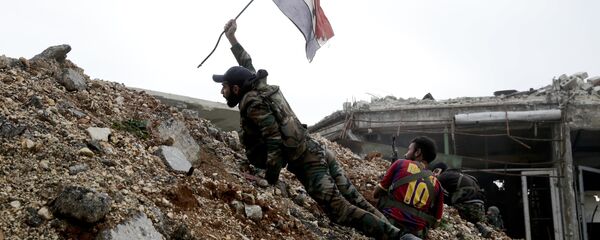On Friday, protesters in the Indian capital of Delhi joined their counterparts in several capitals around the world to protest in front of the local Syrian embassy, accusing the Syrian government of 'genocide' and war crimes in liberated Aleppo. Several hundred protesters participated in the event, with further mass actions planned in the weeks to come.
Together, we can compel world leaders to intervene for Syria —-- With volunteers outside the Syrian embassy in Delhi.#IndiaWithAleppo pic.twitter.com/qD3PO4xNQB
— Salman Nizami (@SalmanNizami_) 18 декабря 2016 г.
Some photos from the Delhi event, shared by a sympathetic local politician.
Deciding to get acquainted with the organizers behind Friday's event, Abbas Shamael Rizvi, an Indian filmmaker and independent political observer, soon discovered that one of the planners was actually the public relations coordinator of Jamaat-e-Islami Hind (JIH), an India-based Islamic organization with ideological ties to the Muslim Brotherhood.
Active on social media, Rizvi made a post on his Facebook page to shine a light on the event and its organizers, linking one of them back via phone numbers to JIH. The central problem, Rizvi stressed, was not that the group was exercising its right to protest, but that they kept their involvement a secret, with official posters for the event only calling on 'concerned Indian citizens' to attend, and making no mention of the Islamic group's involvement. "Why was that information kept secret?" he asked.
The political observer spent the rest of his post explaining the history behind JIH, and its connection to the Muslim Brotherhood. He noted that ideologically and politically, the two organizations are very similar – both founded and guided by the idea of establishing Islamic rule in the countries where they operate. Likewise, both are funded and otherwise promoted by powerful benefactors in the Persian Gulf, in particular by Qatar, which also directly supports terrorist groups operating in Syria.
On Monday, Radio Sputnik got in touch with the political observer to discuss his discovery. Speaking to the broadcaster, Rizvi explained that insofar as the Delhi protest is concerned, "we have to understand what kinds of people are involved in these protests, and their agendas."
The commentator started off by emphasizing that it's important to distinguish the people attending these kinds of protests, both in India and elsewhere. Some, he said, are motivated by principles that are innocent enough, while others aren’t. In any case, protesters can be broken down into three basic categories.
But it is the third category, "the established social activists involved in and leading these protests" – they are the ones whose agendas and motives should be questioned, the observer added. These people "have a strong understanding of the background" to conflicts like the one in Syria. They "even recognize how these wars were started, the motive, what the outcome will be, who will benefit and who will not benefit."
Therefore, in Rizvi's view, it is "surprising that their narrative is still about human empathy…That seems indigestible because if you're so knowledgeable about the crisis, you are well aware of what is really happening."
"These 'concerned Indian citizens' — there were no names mentioned of who was doing the organizing," Rizvi noted. "It's just 'concerned Indian citizens who will gather on a particular day in front of the Embassy and protest and shout slogans. But the fact is there were phone numbers given on the invitation posters. When I got into [investigating] it, it became obvious that I knew a few of them. One was a well-established social activist…But the other was a public relations coordinator for Jamaat-e-Islami Hind (JIH), and that is a prominent organization in India!"
Amusingly, Rizvi noted, JIH's members commenting on his Facebook post denied involvement. "However, if you go to the official Twitter handle of Jamaat-e-Islami Hind, they had officially invited people for the same protest, on the same day at the same time, because there was only one protest on that day."
Inviting people to the protest at Syrian embassy against genocide in Aleppo. https://t.co/aSeGk2faEj
— Jamaat-e-Islami Hind (@JIHMarkaz) 16 декабря 2016 г.
Glimpse of the protest today by concerned citizens at the Syrian Embassy in New Delhi. https://t.co/FOSHg3gCuJ
— Jamaat-e-Islami Hind (@JIHMarkaz) 16 декабря 2016 г.
Going into detail about JIH's social agenda and political background, Rizvi explained that "Jamaat-e-Islami is an offshoot of the Muslim Brotherhood for the Indian subcontinent, working since 1941 in India before independence…Gradually they spread out…first in Pakistan, then in Bangladesh, and they became established organizations working for Muslim welfare in the subcontinent."
"Their modus operandi [includes] working as a social organization, participating in education, which is a very noble thing – brilliant! But there is a political agenda behind it, which is to change the system of governance of the countries that they are in and to work gradually toward that larger goal. Jamaat-e-Islami and the Muslim Brotherhood work for the same goal," Rizvi stressed.
The latter group, in particular, has also "been involved in regime change by revolution under the garb of peaceful demands of justice and democracy," and participated in such efforts in Syria as well.
Ultimately, Rizvi suggested that "involvement of Jamaat-e-Islami/Muslim Brotherhood even in an unofficial way in these protests says a lot."
"Since the Muslim Brotherhood is directly and officially a beneficiary of Qatar," at the same time that Qatar sponsors jihadist militants fighting in Syria, "it is obvious that the organization will keep pushing its lot in Syria. That is where organizations like Jamaat-e-Islami Hind come into the picture. A global campaign is needed to save the cause against Assad. The Western media and Qatari media are at it now."
With that in mind, Rizvi noted, protests like the one in Delhi are organized to put pressure on their host countries, which in turn results in them pressuring Syria and its allies in the international community. Accordingly, Indians can be sure that JIH-organized protests will continue and intensify, the political observer concluded.

